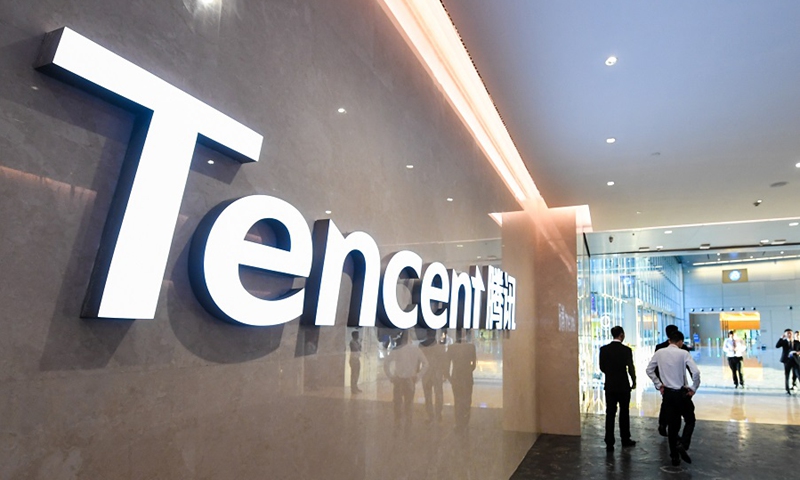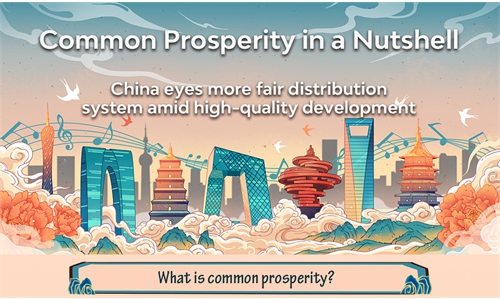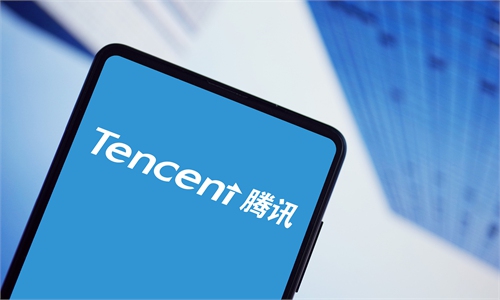Firms join push for common prosperity
Time for corporations to give back to society: experts

Tencent File photo: Xinhua
A day after top Chinese leaders outlined efforts to promote common prosperity, Chinese tech giant Tencent said on Wednesday that it will invest 50 billion yuan ($7.71 billion) to help support the country's bid for common prosperity, after four batches of 100 billion yuan have been invested from April.
The company's swift response is in line with efforts outlined by top leaders at a meeting on Tuesday to promote common prosperity - a crucial part of China's second centenary goal, and could spur broader participation from other corporations, experts said.
At the meeting of the Central Committee for Financial and Economic Affairs, top leaders called for promoting common prosperity while pursuing high-quality development. They also urged efforts such as adjusting income distribution and encouraging high-earning individuals and companies to give back to the society.
"Similar moves from other tech companies can be expected in the future. Internet companies are among those who 'got rich first,' and now it is time to give back to the society," Hu Qimu, chief research fellow at the Sinosteel Economic Research Institute, told the Global Times on Thursday.
Some companies have already indicated their plans to help promote common prosperity.
A branch of Agricultural Bank of China in East China's Zhejiang Province, the pilot zone for common prosperity, has vowed to provide 150 billion yuan over five years to local enterprises, in order to boost industry and talent development, media reported on August 5.
In its latest Social Responsibility Report released on August 5, Alibaba also emphasized that promoting rural revitalization, common prosperity and green sustainability will be the core of Alibaba's public welfare and social responsibilities.
"Being the second-largest economy in the world and likely to become the largest by 2030, China has basically accomplished the historic task of 'letting some people get rich first' and established a mature socialist market economic system," said Hu.
But China's focus at the next stage should be on adjusting social wealth through an income distribution mechanism.
Analysts said that it is time for high-income enterprises to give back to society as they have benefited from the economic dividends of China.
However, many, especially those in the West, have been misinterpreting China's recent regulatory actions and the long-term goal of common prosperity, analysts said, stressing that the regulations do not target any single company but to ensure sustainable growth.
Tencent executives said during an earnings call on Wednesday that the company welcomes more regulations, and it will fully integrate and embrace this wave of new regulatory policies.
"All I want to say is that the West does not understand completely our roadmap toward the ultimate goal of common prosperity for all, or it only stays at the superficial level on the issue," Cong Yi, a professor at the Tianjin University of Finance and Economics, told the Global Times.
Stephen Roach, the American economist who is considered one of the world's leading experts on Asia, for example, said that China is "now using the full force of regulation to strangle the business models and financing capacity of the economy's most dynamic sector."
"What we have done at the moment could not be easily labeled as a 'clampdown'. It's like being overshadowed by the trivial instead of being able to see through the whole picture, the regulatory framework at the top design," said Cong, stressing that the profound changes that some industries and the economy have been undergoing are paving the way for a more balanced and heathy economic growth model that benefits the masses.
Hu also said that the hype by the Western media is intended to undermine confidence in China's path and system.
By promoting common prosperity and increasing people's incomes will also boost consumption, which has overtaken investment and exports as the biggest driver of China's economic growth, analysts said.
"China's consumption used to be driven more by its 400 million middle-income people. Their demand in areas such as childcare, education, travel and health, must be upgraded as China enters into a moderately prosperous society in all respects," said Li Bing, a research fellow of the Academic Center for Chinese Economic Practice and Thinking at Tsinghua University.
More importantly, there are still 1 billion people outside the middle-income group who have yet to become rich, whose incomes need to be raised, and whose huge consumption potential needs to be unleashed, Li added.
China has provided the world with valuable experience, not only in economic development but also on epidemic prevention and control. The country is now trying to set another example for the world in addressing social and economic inequality as it pursues common prosperity, analysts said.



